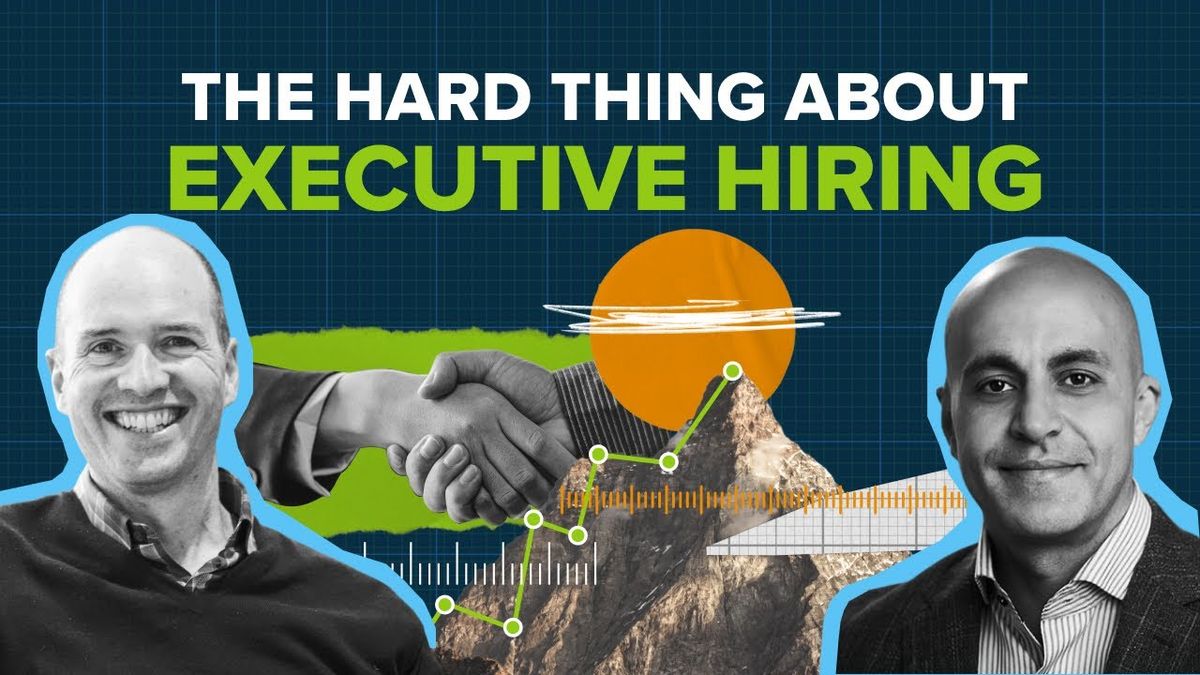Executive Hiring and Firing in Rapidly Scaling Companies | a16z Podcast

This engaging discussion between a16z cofounder Ben Horowitz and Databricks cofounder Ali Ghodsi delves into the complexities of executive hiring and firing.
They explore the challenges that arise when a company scales rapidly after achieving product-market fit, particularly in finding the right leaders at the right time.
Signs of Outgrown Leadership
Leaders may be outgrown when doubts about their effectiveness emerge, they exhibit emotional responses to tasks, or the CEO is providing more ideas than they are receiving from the leader.
Personal issues and a loss of confidence can also affect a leader’s performance, leading to a downward spiral.
The Impact of Hiring Mistakes
Hiring mistakes, especially at the executive level, can be costly, potentially setting the company back by a year and a half to two years when considering the time to realize the mistake, let the executive go, and start a new search.
The Role of CEOs in Hiring
CEOs should immerse themselves in the hiring process, including interviewing candidates, conducting background checks, and having dinners with potential hires.
This direct involvement can help them understand what a great CFO, CRO, or VP of Engineering looks like and make more informed decisions.
The Value of ‘Back Door’ Reference Checks
‘Back door’ reference checks, involving reaching out to contacts who have worked with the candidate but are not listed as references, can provide valuable insights about potential hires.
Importance of Asking Right Questions in Reference Checks
During ‘back door’ reference checks, asking the right questions can provide valuable insights.
For instance, asking if the candidate is the best CFO the reference has ever seen can shed light on the candidate’s capabilities.
I think a mistake a lot of companies make is, in engineering and in product and so forth, the knowledge of how your company works is really really valuable but in sales and marketing, the knowledge of how other people’s companies work is actually the more valuable thing. – Ali Ghodsi
The Power of a Leader’s Superpower
A leader’s superpower, such as creating an exceptional product, stellar communication, or effective team execution, is vital.
These strengths should be amplified and the gaps filled, while also managing any significant weaknesses the leader may possess.
Benefits of External Knowledge in Sales and Marketing Roles
Hiring individuals with knowledge from other companies in sales and marketing roles can be more beneficial than promoting someone internally who only knows the company.
This external perspective can facilitate growth and provide valuable insights.
If you’re giving them a lot of ideas like more ideas and you’re getting out then that’s probably not going to work well. – Ben Horowitz
Handling Underperforming Executives
Addressing underperforming executives can be challenging.
Potential solutions include reassigning them to roles where they can excel, although adjusting their equity or salary can be difficult.
If an executive is not adding value, it may be best to part ways.
The Value of ‘Super ICs’
‘Super ICs’ or ‘super individual contributors’ who excel in their roles but may not be effective leaders can still provide value in positions where they don’t have to manage a large team.
However, it’s crucial not to overestimate an underperforming executive’s potential or overcompensate them in a new role.
The Importance of Honest Conversations
When addressing an underperforming executive, honesty and directness are key.
The executive may already be aware of their underperformance.
It’s also important to directly address executives who are disengaged or ‘checked out’.
Understanding ‘Task-Relevant Maturity’
The concept of ‘task-relevant maturity’, as coined by Andy Grove, refers to the need for new executives to understand the tasks that are relevant to the company until they are proficient in them.
This process requires close guidance or what Horowitz refers to as ‘micromanagement’.




